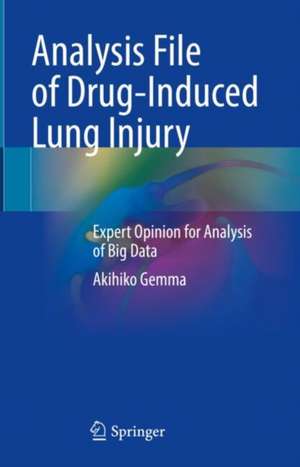Analysis File of Drug-Induced Lung Injury: Expert Opinion for Analysis of Big Data
Autor Akihiko Gemmaen Limba Engleză Hardback – 19 sep 2024
Preț: 715.35 lei
Preț vechi: 753.01 lei
-5% Nou
Puncte Express: 1073
Preț estimativ în valută:
136.93€ • 148.78$ • 115.09£
136.93€ • 148.78$ • 115.09£
Carte disponibilă
Livrare economică 31 martie-14 aprilie
Preluare comenzi: 021 569.72.76
Specificații
ISBN-13: 9789819734450
ISBN-10: 9819734452
Pagini: 128
Ilustrații: X, 110 p. 30 illus., 20 illus. in color.
Dimensiuni: 155 x 235 x 13 mm
Greutate: 0.41 kg
Ediția:2024
Editura: Springer Nature Singapore
Colecția Springer
Locul publicării:Singapore, Singapore
ISBN-10: 9819734452
Pagini: 128
Ilustrații: X, 110 p. 30 illus., 20 illus. in color.
Dimensiuni: 155 x 235 x 13 mm
Greutate: 0.41 kg
Ediția:2024
Editura: Springer Nature Singapore
Colecția Springer
Locul publicării:Singapore, Singapore
Cuprins
Part I Understanding Drug-Induced Lung Injuries.- 1 Understanding Drug-Induced Lung Injuries.- Part 2 Actual Practice in Drug-Induced Lung Injuries of Each Drug.- 2 EGFR inhibitors (gefitinib, erlotinib, afatinib, osimertinib).- 3 Anti-EGFR antibodies (cetuximab, panitumumab, necitumumab).- 4 mTOR inhibitors (temsirolimus, everolimus).- 5 Proteasome inhibitor (bortezomib).- 6 Immune checkpoint inhibitors (nivolumab, pembrolizumab, atezolizumab, durvalumab).- 7 Neoangiogenesis inhibitors (sunitinib, sorafenib, bevacizumab).- 8 Other molecular targeted drugs (crizotinib, alectinib, etc.).- 9 Antibody-drug conjugates (ADC) (trastuzumab emtansine, trastuzumab deruxtecan).- 10 Anti-cancer drugs (TS-1, taxanes, CPT-11, platinum-containing drugs, etc.).
Notă biografică
Akihiko Gemma
President, Nippon Medical School
1983:Graduated from the Faculty of Medicine of Nippon Medical School
1986:Served as a trainee doctor in the Pathology Department of the National Cancer Center Research Institute
1989:Graduated from Nippon Medical School Graduate School
1995:Studied at National Cancer Institute of National Institutes of Health (NIH), the United States
1998:Appointed as a lecturer to Nippon Medical School
2004:Appointed as an associate professor
2008:Appointed as a senior professor to the Department of Medicine (Respiratory, Infectious Disease and Oncology Division)
2012:Appointed as a professor to the Graduate School of Medicine in charge of respiratory medicine
2013:Appointed dean of Department of Medicine
2015:Appointed president
Textul de pe ultima copertă
This book describes the pathologic conditions of drug-induced lung injuries, monitoring strategies, and guides on how to interpret the evidence. It also dives into particular drugs that caused the disorder, such as EGFR inhibitors, anti-EGFR antibodies, mTOR inhibitors, proteasome inhibitors, immune checkpoint inhibitors, neoangiogenesis inhibitors, and other molecular targeted drugs. It outlines the analysis and interpretation of the post-marketing survey on surveillance of each drug for inducing pulmonary lesions presenting diffuse haziness. The data and analysis from this survey are valuable since a guideline is yet to be established due to limited clinical evidence and cases. As new drugs are developed, establishing treatment and event management is crucial. Thus, Drug-induced Pulmonary Disorder in Medical Oncology - Expert Opinion to Decipher Big Data summarizes the accumulated information to provide a foundation for further research advancement. The book offers a refreshing alternative to current approaches to medical oncology and respiratory diseases professionals and will also attract medical affairs members in global pharmaceutical companies.
Caracteristici
Presents abundant knowledge on event management of drug-induced lung disorders In-depth analysis and interpretation of post-marketing surveillance data for various drugs causing pulmonary disorders Unique focus on bridging clinical evidence gaps, offering a foundation for advanced research in medical oncology
